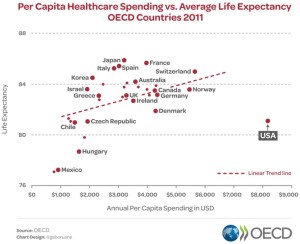
IBM has reported that its super computer Watson can now transform, Healthcare, Financial and many other industries by gathering huge terabytes of data, and use its computational power to do analysis. Health benefits company Wellpoint saw an opportunity to apply IBM Watson in a way that could improve the quality and efficiency of healthcare decisions. Memorial Sloan Kettering trained Watson to synthesize vast amounts of data, such as physicians’ notes and reports, lab results and clinical research, to help community physicians identify treatment options for cancer patients
Anthem Blue Cross (another subsidiary of WellPoint) and Blue Shield of California Life & Health Insurance Company, California’s largest health insurance companies, announced yesterday, that they will be creating a large health information exchange. This exchange will be called the California Integrated Data Exchange or Cal Index and is expected to be launched at the end of the year. It would contain medical records of about nine million Californians acquired from claims data held by the two companies.
The objective of Cal Index is to give health providers immediate access to patients’ medical histories. About $80 million is expected to be invested by the two competitors on this project to keep it running for three years. They will provide data integration assistance to 30 large provider organizations.
Today — the National Healthcare Expenditure (NHE) for the USA is $3.5+ trillion per year (about 18% of our GDP) and it’s growing at about 5% per year (for as far as the eye can see). The system we have is optimized around revenue and profits — not safety and quality. That safety and quality is best highlighted by what’s known as “preventable medical errors” inside hospitals. That number? Somewhere between 210,000 and 440,000 – per year. Please see the chart which shows the results of the OECD survey.
The US is off the charts and I had a tough time fitting the costs of over $ 8,000 per capita and further it is growing at 5% annually for the foreseeable future. It is not if; but when will the baby boomers take it over $ 10,000, and become a crushing burden of 20% of GDP. The disparities in income are now so extreme; that we will have to increase our contributions for basic healthcare for the poor and disabled drastically, or bring about a more equitable tax policy to encourage a more consumer oriented healthcare. Increased consumer engagement, innovative solutions, EHRs, Analytics and universal access will lead to success, and there is no other path but to increase our focus on doing and not sermonizing. For a just society, we must try harder; to become again the beacon on the hill for the world’s health!.